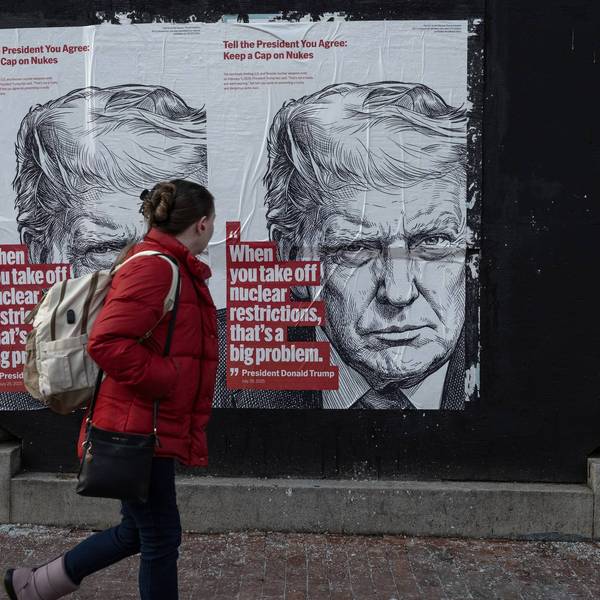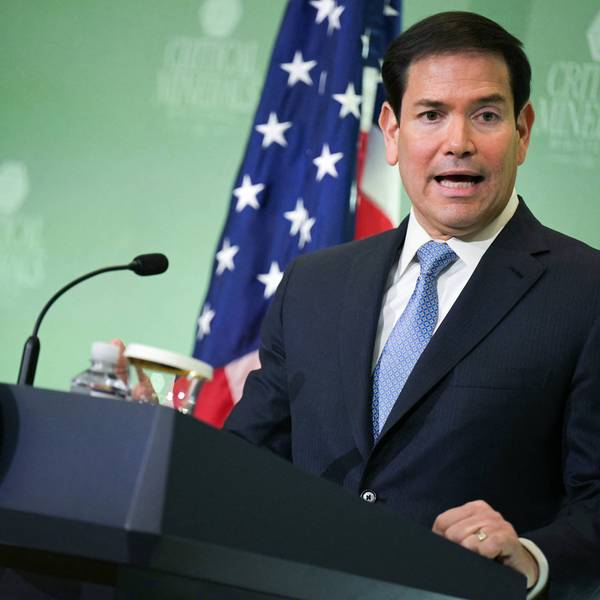Anti-nuclear weapons groups warned that the Trump administration is ushering in a renewed arms race as National Security Adviser John Bolton confirmed late Tuesday that the U.S. intends to exit the intermediate-range nuclear forces treaty (INF), the landmark agreement forged with Russia three decades ago.
In response, the Kremlin confirmed those fears, saying that is exactly how the Russians view the move by the Trump administration.
"This is a very dangerous intention. In fact, it declares an intention to start an arms race and to build up military potential," Russian presidential spokesperson Dmitry Peskov told reporters in Moscow on Wednesday, adding that the decision would make the world a less safe place.
After meeting with Russian President Vladimir Putin and other officials, Bolton suggested that the treaty is ineffective in providing security against today's global threats--a position which the Union of Concerned Scientists (UCS) denounced as deeply "shortsighted."
After its signing in 1987, the INF "helped rachet down the U.S.-Soviet arms race and defuse tensions," wrote Lisbeth Gronlund, co-director of the Global Security Program at UCS. "Withdrawing from the treaty, conversely, will open the door to a new and unconstrained competition, threatening U.S.-Russian nuclear stability."
"Walking away from INF should be an option of absolute last resort, yet no serious effort has been made by the Trump administration to resolve mutual allegations of treaty violations and bring Russia back into compliance with a valuable agreement." --Derek Johnson, Global ZeroThe treaty resulted in the destruction of nearly 900 U.S. missiles and more than 1,800 missiles belonging to the then-Soviet Union, as it banned the use of nuclear weapons with a range of 300 to 3,400 miles. It has been credited with largely eliminating nuclear weapons in Europe.
Bolton accused Russia of being in violation of the treaty due to its development of the 9M729 ballistic missile. But Gronlund suggested that the U.S. is truly concerned with constraints on its own nuclear and ballistic weapons programs.
"What apparently underlies this decision is a general antipathy by key members of the administration to negotiated agreements that in any way constrain U.S. weapons systems," said Gronlund. "But these agreements also constrain weapons deployment by the other signatories, as well as provide critical verification and transparency measures that reduce uncertainties and strengthen U.S. security."
In the interest of loosening constraints on its own military capabilities, Global Zero executive director Derek Johnson said, the Trump administration is reversing "decades of progress."
"Walking away from INF should be an option of absolute last resort, yet no serious effort has been made by the Trump administration to resolve mutual allegations of treaty violations and bring Russia back into compliance with a valuable agreement," said Johnson.
In the Bulletin of Atomic Scientists, Lawrence J. Korb wrote that the Trump administration's withdrawal from the INF is just the latest wrench the U.S. has thrown into global attempts to curb nuclear proliferation and should be seen as an effort to discourage cooperation between countries. Trump has thus far refused to sign a new Strategic Arms Reduction Treaty (START), which Putin has suggested extending for five years and following up with a new agreement that could bring the number of deployed nuclear weapons below 1,000.
According to Korb, declining to sign the treaty along with exiting the INF is akin to the U.S. passing up vital opportunities to monitor Russia's activities and working together to curb nuclear competition.
"To reverse this dangerous trend toward arms control collapse, the United States should immediately take Putin up on his offer," wrote Korb. "In addition, the United States should allow the Russians to inspect the proposed missile defense sites in Poland and Romania to demonstrate that they cannot be used for offensive purposes. In return, rather than withdraw from the INF Treaty, the United States should ask to inspect the Russian 9M729 (SSC-8), which is the missile the United States claims violates the INF, and seek to negotiate a solution, if the missile is indeed found to violate the treaty."
Meanwhile, Susi Snyder of the No Nukes Campaign wrote that the biggest beneficiaries of the U.S. withdrawal are corporations that invest in nuclear weapons.




